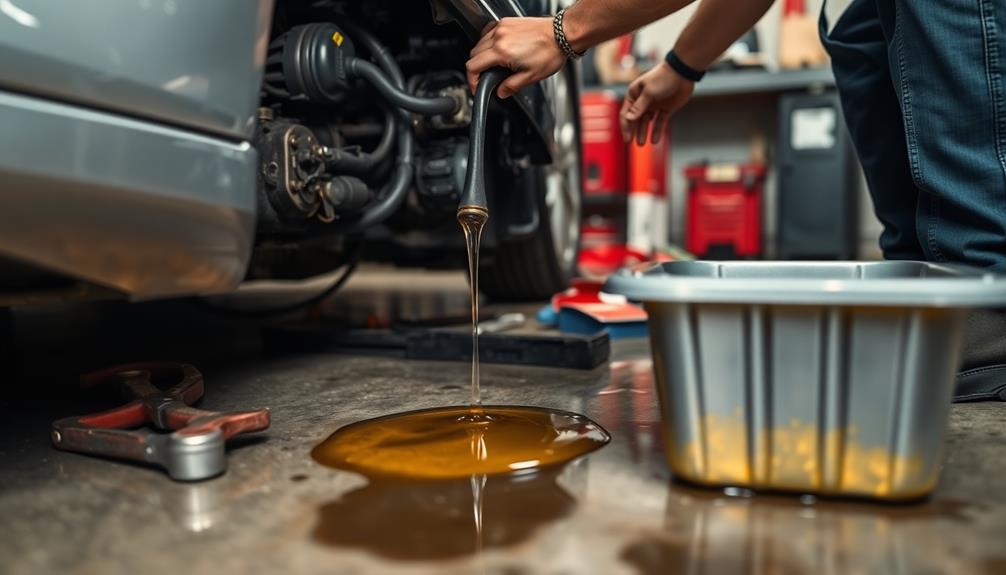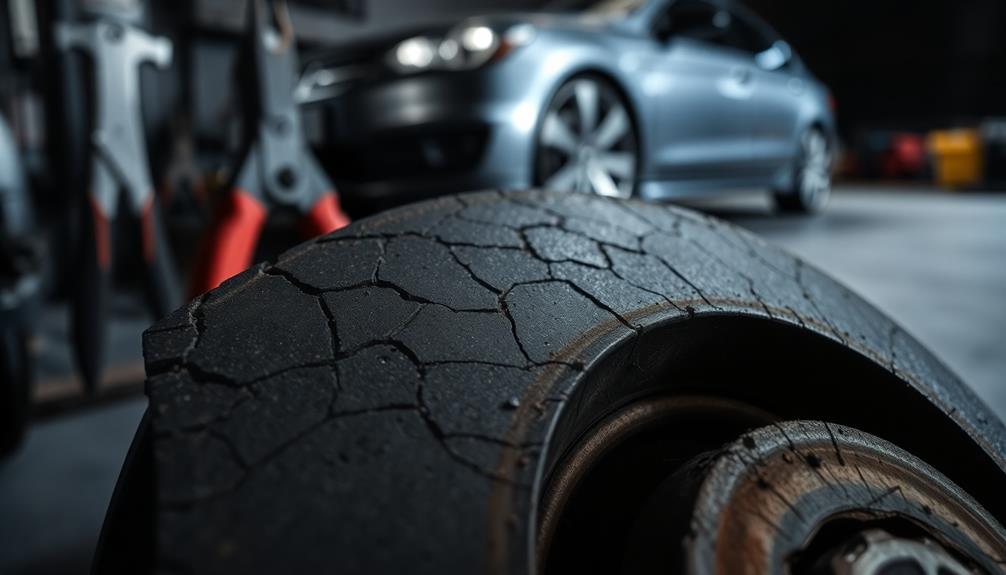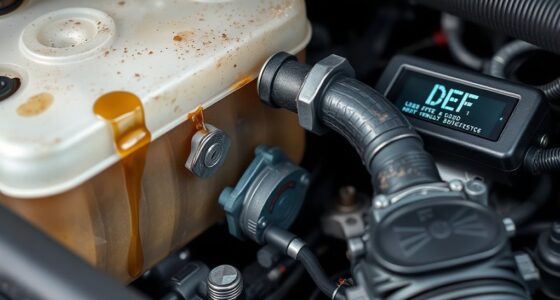If you've got an oil leak, acting fast can save you thousands in repairs. Start by checking the fluid color and consistency to identify the type of leak. A cardboard test can help pinpoint where it's dripping. Thicker oil or additives like ATP AT-205 Re-Seal may offer a temporary solution to slow small leaks. Remember, ignoring oil leaks can lead to serious engine damage and even fire hazards. For long-term fixes, consider replacing worn seals or gaskets. Want to explore effective methods for dealing with oil leaks and ensuring your engine stays healthy?
Key Takeaways
- Use high-viscosity oil or additives like ATP AT-205 Re-Seal as temporary solutions to slow down small leaks and prevent further damage.
- Regularly monitor fluid levels to detect leaks early and differentiate between leaks and burning oil, saving on costly repairs.
- Conduct routine inspections for worn gaskets and seals, replacing them promptly to prevent major leaks and engine damage.
- Utilize the cardboard test to identify leak sources and color, allowing for informed decisions on quick fixes or professional repairs.
- Seek professional assistance for persistent leaks, as qualified mechanics can diagnose issues accurately and recommend effective long-term solutions.
Identifying Oil Leaks
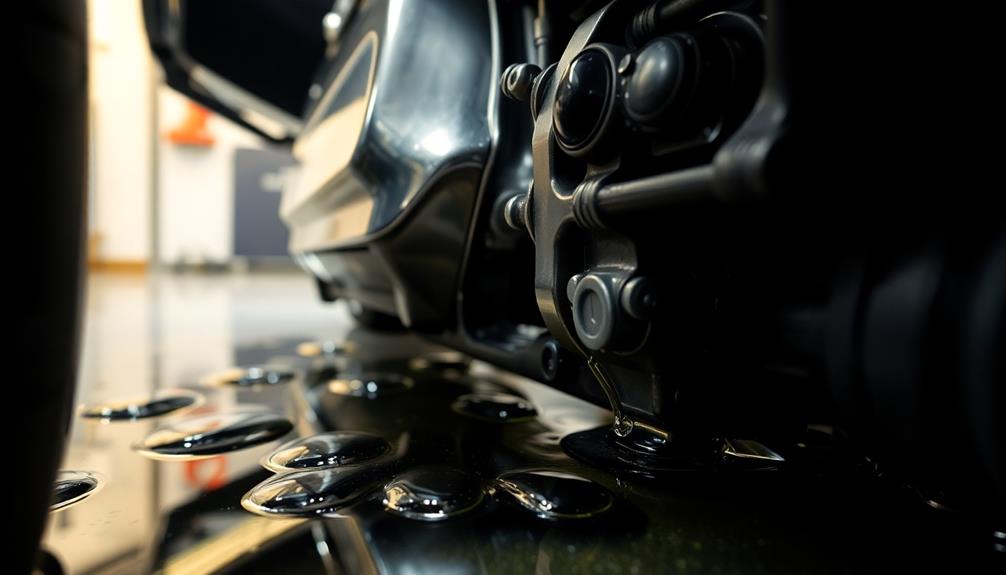
When you notice dark puddles or spots under your vehicle, it's vital to identify the source of the leak quickly. Start by checking the color of the fluid. Motor oil typically appears black or brown, while transmission oil has a reddish hue. Power steering fluid is usually clear. This initial step can help you determine whether you're dealing with oil leaks or something else.
Regularly monitoring fluid levels is essential. It allows you to pinpoint the source of the leak and differentiate between engine oil leaks and oil burning. If you see an oily engine surface or catch a burning oil smell during your drive, these are signs that you need to act fast.
Using a cardboard test can also be beneficial. Place a piece of cardboard under your vehicle to catch any dripping fluid. The color and consistency of the fluid will help you identify the leak's location.
Common Causes of Oil Leaks

What causes oil leaks in your vehicle? Several factors contribute to this frustrating issue.
First, worn-out gaskets and seals are often the primary culprits. Over time, age, heat, and environmental conditions wear them down, leading to leaks.
Next, if your oil filter isn't properly tightened or is damaged, it won't create a good seal during installation, which can result in oil seeping out.
Another common source of oil leaks is the drain plug. If it's loose or damaged, perhaps due to over-tightening or debris wear, oil can escape easily.
Pay attention to the valve cover gasket as well; if it fails, oil can drip onto hot exhaust components, increasing the risk of fire.
Lastly, engine wear and tear plays a significant role. As your engine ages, it can develop openings that allow oil to escape.
This issue can be exacerbated if you overfill your oil, creating excessive pressure that forces oil out of these openings.
Risks of Ignoring Oil Leaks
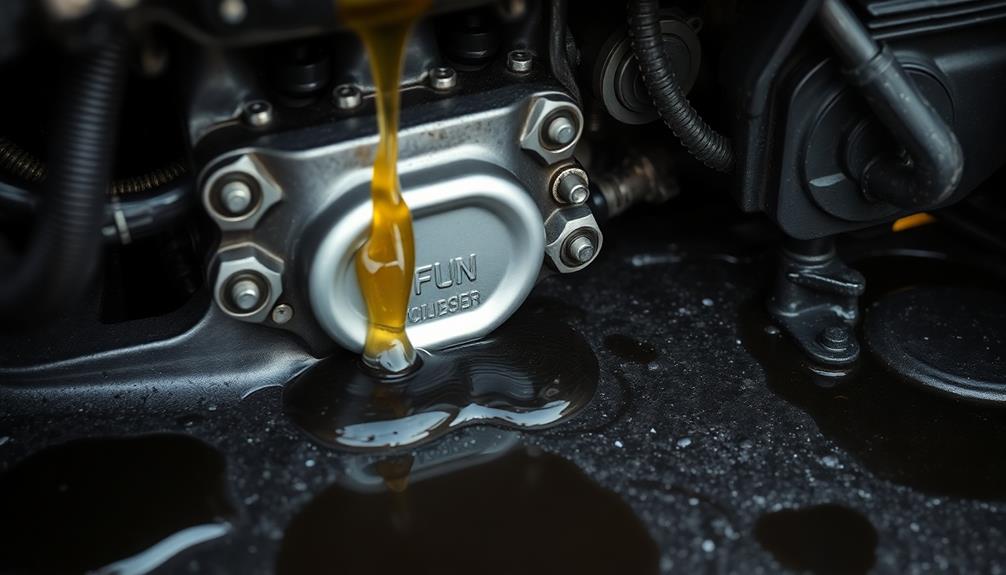
Ignoring oil leaks can lead to serious engine damage, skyrocketing your repair costs.
As the oil level drops, your engine risks overheating and wearing out faster, which could be a costly mistake.
Plus, leaking oil poses fire hazards, especially if it drips onto hot components, so it's essential to address any leaks immediately.
Engine Damage Acceleration
Neglecting oil leaks can quickly lead to serious engine damage, as the rapid depletion of oil levels compromises lubrication and accelerates wear on critical components. If you ignore even a small oil leak, it can escalate into a major leak, causing significant wear and tear on engine parts. This not only affects performance but can also lead to expensive repairs.
| Consequence | Description |
|---|---|
| Insufficient Lubrication | Low oil levels increase friction and wear on engine parts. |
| Overheating | Lack of lubrication can cause the engine to overheat. |
| Critical Damage | Prolonged leaks can damage gaskets and seals. |
| Fire Hazard | Oil on hot surfaces poses a risk of engine fires. |
| Escalating Issues | Small leaks often indicate larger problems requiring urgent action. |
The longer you wait to address an oil leak, the more likely you are to face catastrophic engine failure. By acting quickly, you can prevent costly repairs and keep your vehicle running safely and efficiently. Remember, a small leak today could lead to serious engine damage tomorrow.
Increased Repair Costs
Failing to address oil leaks can lead to skyrocketing repair costs that strain your budget. When your engine is leaking oil, it puts you at risk of severe engine damage.
If you ignore those leaks, low oil levels can cause overheating, leading to catastrophic failures that may require expensive engine overhauls or even replacements. The longer you wait, the greater the chance of increased repair costs.
Many drivers think they can simply add oil to compensate for leaks, but this approach only delays the inevitable. Ongoing oil changes become a burden as you spend money on oil while neglecting the root cause of the problem.
Each time your vehicle loses oil, you risk damaging critical engine components, which can escalate costs considerably.
Fire Hazard Risks
Just one small oil leak can lead to serious fire hazards if left unchecked. Oil dripping onto hot engine components, like exhaust manifolds, can ignite and potentially cause engine fires.
It's alarming to note that a considerable percentage of vehicle fires stem from oil leaks, which highlights the urgency of addressing these issues promptly. Ignoring these leaks not only threatens your vehicle but also endangers surrounding cars and properties.
When oil accumulates and ignites, it can escalate into a larger fire, putting everyone at risk. The danger grows with the age of your vehicle; older engines often have worn gaskets and seals, increasing the likelihood of leaks.
To protect yourself and your investment, regular maintenance is essential. By routinely checking for oil leaks and addressing them quickly, you can greatly reduce the risk of fire hazards associated with leaking oil.
Don't wait until it's too late—stay proactive about your vehicle's health. Taking care of those small issues now can save you from devastating consequences down the line. Ignoring seemingly minor problems, such as unusual noises or vibrations, can lead to costly repairs if left unchecked. One important **car rust sign to watch** is the appearance of small bubbles or blisters in your vehicle’s paint, which could indicate corrosion underneath. Regular inspections and prompt attention to these details can significantly extend your car’s lifespan and keep you safely on the road.
Quick Fix Solutions
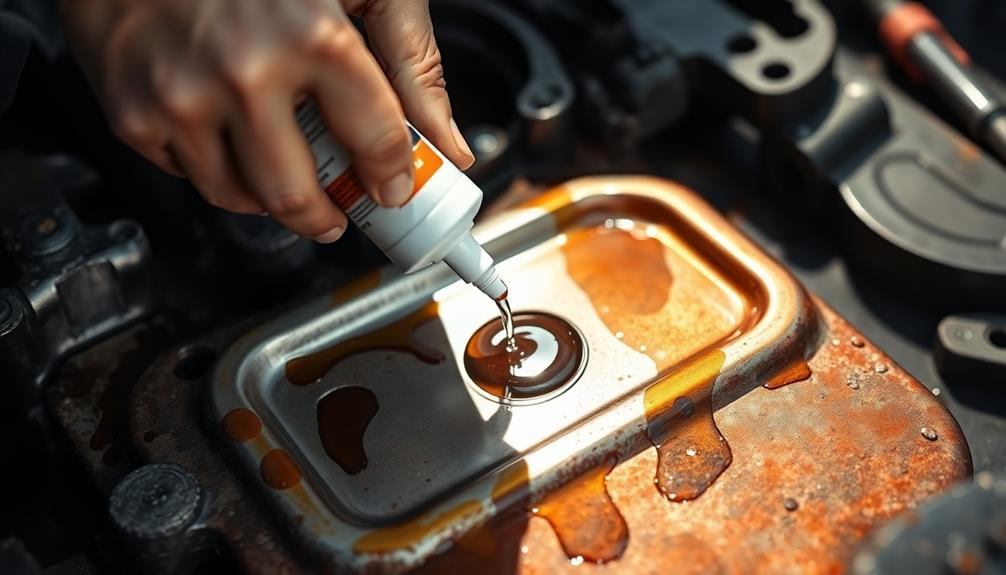
When you notice an oil leak, quick fix solutions can help you manage the situation until you can address the underlying issue. For a small oil leak, consider using thicker viscosity oil, which can slow down the leak temporarily.
Oil additives like ATP AT-205 Re-Seal work wonders by reconditioning seals to create tighter fits, offering a quick solution. Another budget-friendly option is Motor Honey Engine Oil Leak Stopper; just pour it into your engine oil to help stop minor leaks without requiring extensive repairs.
Many car owners turn to Lucas Heavy Duty Oil Stabilizer for a temporary fix against slow oil leaks. While these oil additives can prevent immediate oil loss and save your driveway from stains, keep in mind they often mask more significant problems.
It's essential to monitor the effectiveness of these temporary fixes regularly. Relying solely on them can lead to more considerable engine damage if you don't address the root cause of the engine oil leak.
Long-Term Repair Options
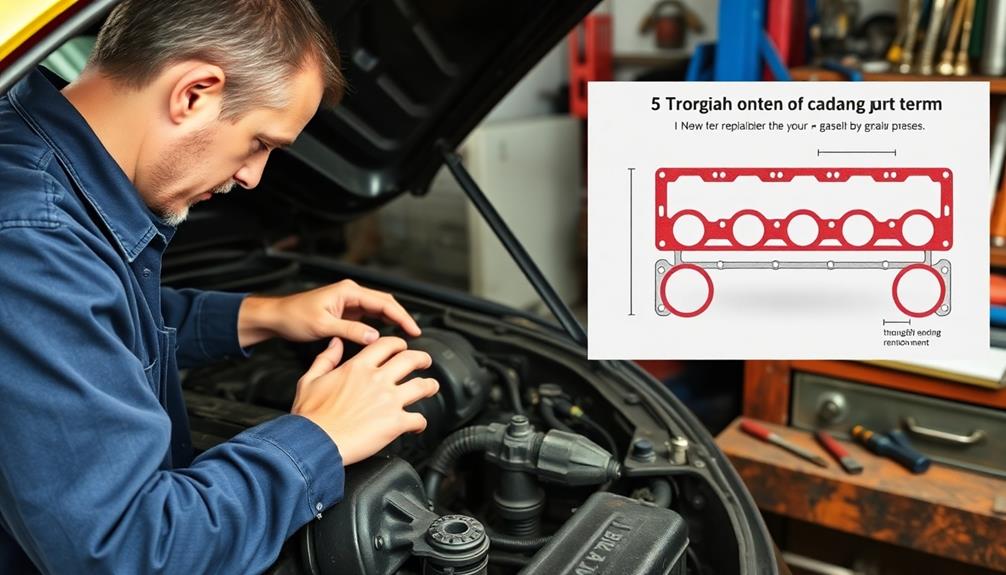
To tackle oil leaks effectively, you'll want to focus on long-term repair options that address the root cause rather than just the symptoms.
Replacing worn-out gaskets and seals is vital for preventing leaks and maintaining your engine's integrity, similar to how understanding IRA Inheritance Rules can protect your financial future. If you notice oil seeping from areas like the rear main seal, it's wise to seek professional help.
While repairs can cost between $600 and $1,000, it's a necessary investment to prevent significant oil loss and further engine damage.
Regular oil changes and maintenance checks can help you spot potential leak sources early on. By being proactive, you'll reduce the likelihood of facing costly repairs down the line.
Additionally, using high-quality oils and sealants can extend the life of your engine components and minimize leaks caused by seal degradation.
Consulting experienced mechanics is essential for persistent leaks. They can provide an accurate diagnosis and recommend effective long-term repair strategies tailored to your vehicle's needs.
Importance of Regular Maintenance

Regular maintenance is your best defense against oil leaks and engine damage. By keeping an eye on your oil levels and checking for leaks early, you can save yourself from costly repairs later.
Additionally, just like a robot vacuum's regular cleaning helps maintain home hygiene, consistent car maintenance guarantees your engine operates smoothly.
Plus, using quality oils and sealants not only extends your engine's life but also keeps those essential gaskets and seals in top shape.
Preventive Maintenance Benefits
Keeping your vehicle in top shape is crucial for avoiding costly repairs and ensuring a smooth ride. Regular preventive maintenance, including oil changes every 3,000 to 7,500 miles, plays an important role in preventing oil leaks and maintaining peak engine performance.
It's similar to how best value vacuum cleaners offer both affordability and effectiveness, helping you maintain a spotless home without breaking the bank. By staying on top of routine checks for fluid levels and conditions, you can catch signs that a leak is coming before it turns into a major issue.
Using high-quality oils and sealants during your maintenance can enhance the longevity of engine components, greatly reducing the risk of leaks. Regular inspections of gaskets, seals, and filters help identify wear and tear early, allowing you to address problems before they escalate into costly repairs.
Proactive maintenance not only extends your vehicle's lifespan but also improves fuel efficiency, saving you money at the pump. By prioritizing these preventive measures, you're not just protecting your investment; you're also minimizing the likelihood of severe repair costs associated with neglected oil leaks.
Early Leak Detection
Detecting oil leaks early can save you from the headaches and expenses that come with severe engine damage. Regular maintenance, including routine oil changes, is essential for ensuring your engine runs smoothly. By changing your oil every 3,000 to 7,500 miles, you not only maintain proper lubrication but also give yourself an opportunity for early leak detection.
Make it a habit to check your oil levels regularly and inspect for any signs of leaks, like dark puddles under your vehicle. A lit oil warning light is another vital indicator that something might be wrong. The sooner you notice these warning signs, the better you can prevent costly repairs down the line.
Don't forget that the condition of your seals and gaskets can greatly influence your engine's integrity. Using high-quality oils and sealants during maintenance can greatly reduce the likelihood of gasket deterioration, which aids in leak prevention.
Using Oil Additives
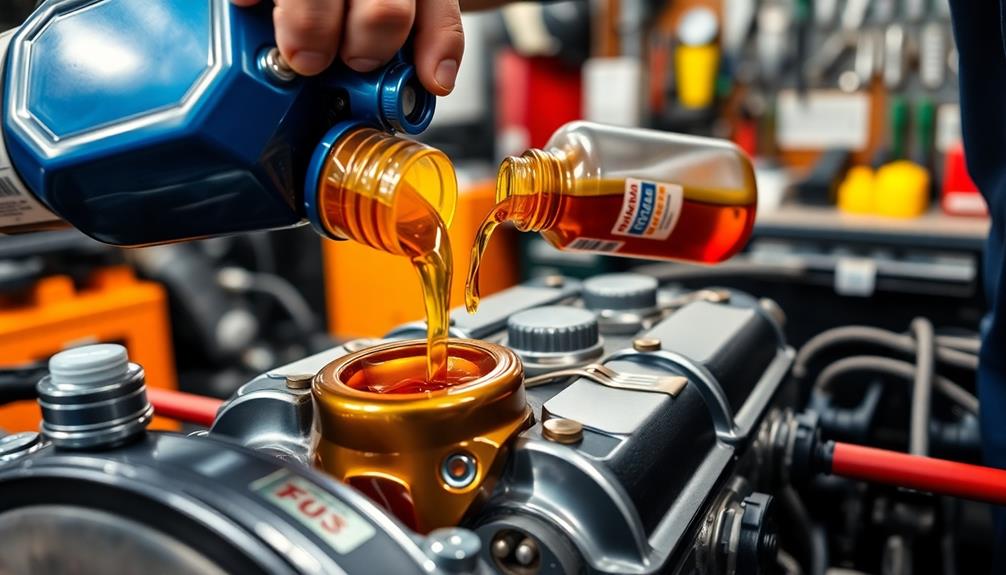
If you're dealing with a minor oil leak, using oil additives can be a quick and effective solution. These products, like Lucas Heavy Duty Oil Stabilizer and ATP AT-205 Re-Seal, work by improving the viscosity of your engine oil and restoring the integrity of seals and gaskets. This can temporarily seal minor leaks and help prevent further leaking oil, giving you peace of mind without an immediate trip to the mechanic.
Many drivers have found success with oil stop leak products, including BlueDevil Oil Stop Leak, which specifically targets leaks from timing cover gaskets. Users often report seeing results within just 100-200 miles of driving, making it a convenient fix.
Additionally, oil additives can enhance lubrication, potentially reducing oil consumption and saving you money on frequent top-ups.
However, keep in mind that oil additives aren't a long-term solution. Persistent leaks should be properly addressed through repairs.
Always verify the oil additives you choose are compatible with your vehicle's engine and oil type to avoid any negative interactions that could worsen the situation.
Customer Experiences With Products

Customer experiences with oil stop leak products reveal a mix of optimism and caution. Many users report that products like BlueDevil Oil Stop Leak effectively halt their oil leaks, often within just 100-200 miles of driving. For instance, a 2001 Ford Escape owner claimed to have stopped a significant leak after using a solution and driving about 300 km.
However, concerns about compatibility with engine flushes linger. Customers wonder if these products might reverse the sealing effects. Fortunately, manufacturers assure you that they won't. Feedback shows that specific products work well for various leaks, including timing cover gasket and rear main seal leaks, highlighting their versatility across different vehicle models.
Here's a quick look at what some users experienced:
| User Experience | Outcome |
|---|---|
| 2001 Ford Escape | Stopped significant oil leak |
| BlueDevil Product | Cessation of leak within 200 miles |
| Compatibility with flushes | No adverse effects noted |
| Success in various vehicles | Effective on valve cover gasket leaks |
In community discussions, many celebrate their successes, while others emphasize the need for professional diagnosis of complex leaking oil issues.
Monitoring and Diagnosing Leaks
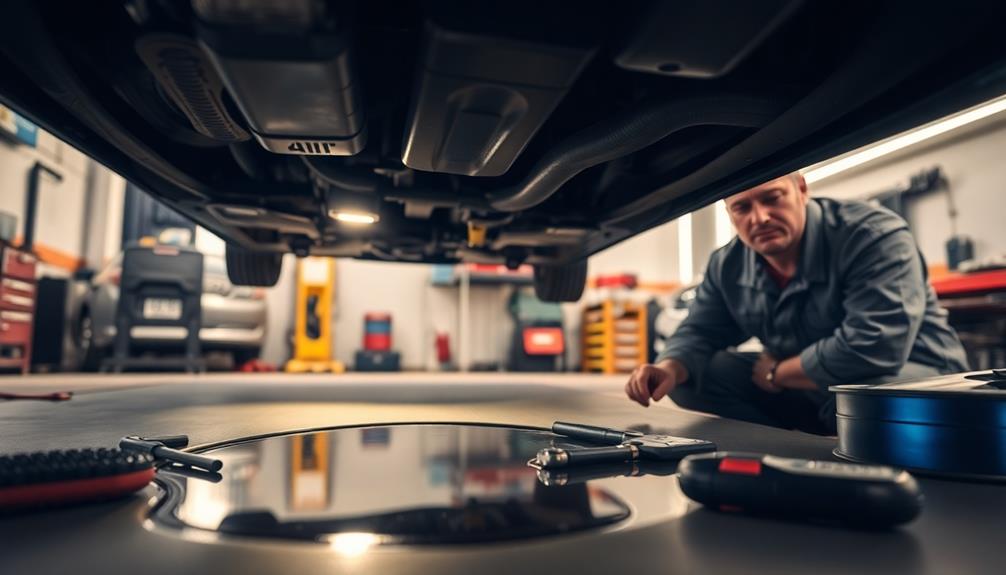
Awareness is essential when it comes to monitoring and diagnosing oil leaks in your vehicle. By staying vigilant, you can catch issues early and avoid costly repairs. Start by regularly monitoring your oil levels; a significant drop may indicate that oil leaks are present.
Here are a few key steps to help you diagnose potential leaks:
- Check for dark puddles or spots under your vehicle, which can signal oil leaks needing immediate attention.
- Inspect the engine surface for any oily residue, as this could point to seepage from gaskets and seals.
- Utilize a cardboard test under your vehicle to determine the leak's source by noting the fluid's location and color.
Additionally, be aware of any burning oil smells while driving, as this might mean oil is leaking onto hot engine parts, posing a fire hazard.
A proactive approach in inspecting components can save you thousands in repairs and keep your vehicle running smoothly. Regular checks and attention to detail will make certain you catch any oil leaks before they escalate into bigger problems.
Professional Assistance and Resources
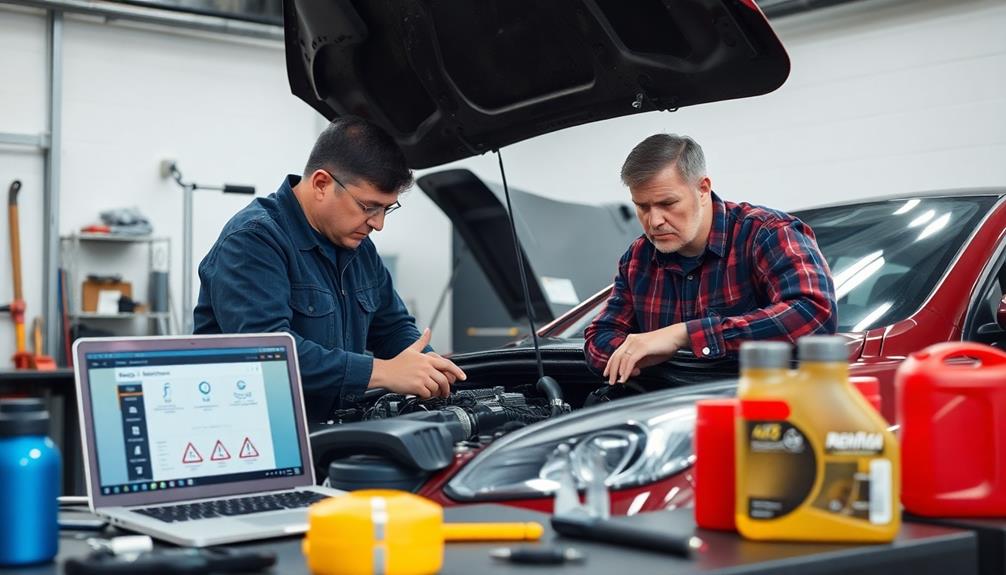
When you're facing an oil leak, finding a qualified mechanic is key to getting a proper diagnosis and repair.
Don't underestimate the power of online resources either; forums and YouTube tutorials can offer practical advice and tips from those who've been in your shoes.
With the right support, you can tackle that leak with confidence.
Finding Qualified Mechanics
Finding a qualified mechanic can make all the difference in addressing your vehicle's oil leak effectively. Start by seeking out mechanics certified by organizations like the National Institute for Automotive Service Excellence (ASE). This certification guarantees they meet industry standards for automotive repair and maintenance.
To find the right fit, consider these strategies:
- Check customer reviews: Use platforms like Yelp, Google Reviews, and Angie's List to gauge local mechanics' reputations.
- Look for free diagnostics: Many automotive repair shops provide free diagnostics or estimates, helping you compare potential repair costs.
- Ask for recommendations: Reach out to friends, family, or local car enthusiasts for trustworthy referrals based on their personal experiences.
You can also utilize professional networks like the Better Business Bureau (BBB) to identify mechanics with solid track records and minimal complaints.
This proactive approach to finding qualified mechanics not only saves you time but also enhances your chances of receiving quality service for your vehicle.
Helpful Online Resources
Utilizing online resources can greatly enhance your ability to address oil leaks in your vehicle. By tapping into these helpful online resources, you can find a wealth of information that empowers you to tackle repairs confidently.
| Resource Type | Description |
|---|---|
| Service Manuals | Access model-specific manuals for detailed repair instructions and troubleshooting guidance. |
| Online Forums | Join communities where you can share experiences and gain insights from others who've faced similar oil leak issues. |
| YouTube Tutorials | Watch step-by-step videos that guide you through common oil leak repairs, making DIY projects more manageable. |
| Mechanic Consultations | Get professional insights by consulting with experienced mechanics who can help diagnose and suggest effective repairs. |
| Newsletters & Articles | Stay informed about the latest techniques and products for maintaining your vehicle and preventing oil leaks. |
These resources can save you time and money while keeping your vehicle in top shape. Don't hesitate to utilize these tools; they'll provide you with the knowledge needed to address that pesky oil leak effectively!
Frequently Asked Questions
How Much Would It Cost to Fix an Oil Leak?
Fixing an oil leak can cost anywhere from $10 to over $1,000, depending on the severity. Simple repairs are cheaper, while complex issues, like rear main seal leaks, can really add up.
Can You Permanently Fix an Oil Leak?
You can permanently fix an oil leak by replacing damaged gaskets or seals, maintaining regular inspections, and addressing issues promptly. Don't rely on temporary solutions; proactive measures will keep your engine healthy and save you money.
Does Oil Leak Fix Work?
Oil leak fix products can work, especially for minor leaks. You might see results within 100-200 miles, but remember, they're temporary solutions. It's essential to address any underlying issues for long-term success.
What Is the Best Quick Fix for Oil Leaks?
For a quick fix to oil leaks, try products like Motor Honey or ATP AT-205. They're easy to use, requiring no tools, but remember, they're temporary solutions and won't replace necessary repairs.
Conclusion
To sum up, addressing oil leaks promptly can save you from costly repairs down the line. Did you know that nearly 10% of vehicles on the road have an oil leak? Don't ignore the signs—monitor your car regularly and consider quick fix solutions. Whether you opt for DIY methods or professional help, taking action now can keep your engine running smoothly and extend its lifespan. Protect your investment and drive with confidence!
